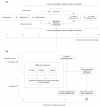Evaluating an in-home multicomponent cognitive behavioural programme to manage concerns about falls and associated activity avoidance in frail community-dwelling older people: Design of a randomised control trial [NCT01358032]
- PMID: 21933436
- PMCID: PMC3189875
- DOI: 10.1186/1472-6963-11-228
Evaluating an in-home multicomponent cognitive behavioural programme to manage concerns about falls and associated activity avoidance in frail community-dwelling older people: Design of a randomised control trial [NCT01358032]
Abstract
Background: Concerns about falls are frequently reported by older people. These concerns can have serious consequences such as an increased risk of falls and the subsequent avoidance of activities. Previous studies have shown the effectiveness of a multicomponent group programme to reduce concerns about falls. However, owing to health problems older people may not be able to attend a group programme. Therefore, we adapted the group approach to an individual in-home programme.
Methods/design: A two-group randomised controlled trial has been developed to evaluate the in-home multicomponent cognitive behavioural programme to manage concerns about falls and associated activity avoidance in frail older people living in the community. Persons were eligible for study if they were 70 years of age or over, perceived their general health as fair or poor, had at least some concerns about falls and associated avoidance of activity. After screening for eligibility in a random sample of older people, eligible persons received a baseline assessment and were subsequently allocated to the intervention or control group. Persons assigned to the intervention group were invited to participate in the programme, while those assigned to the control group received care as usual. The programme consists of seven sessions, comprising three home visits and four telephone contacts. The sessions are aimed at instilling adaptive and realistic views about falls, as well as increasing activity and safe behaviour. An effect evaluation, a process evaluation and an economic evaluation are conducted. Follow-up measurements for the effect evaluation are carried out 5 and 12 months after the baseline measurement. The primary outcomes of the effect evaluation are concerns about falls and avoidance of activity as a result of these concerns. Other outcomes are disability and falls. The process evaluation measures: the population characteristics reached; protocol adherence by facilitators; protocol adherence by participants (engagement in exposure and homework); opinions about the programme of participants and facilitators; perceived benefits and achievements; and experienced barriers. The economic evaluation examines the impact on health-care utilisation, as well as related costs.
Discussion: A total number of 389 participants is included in the study. Final results are expected in 2012.
Trial registration: NCT01358032.
Figures

References
Publication types
MeSH terms
Associated data
LinkOut - more resources
Full Text Sources
Medical

